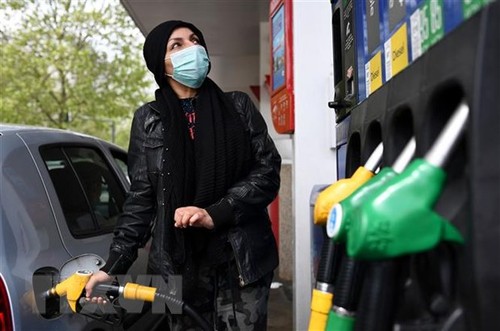 At a petroleum station in Paris (photo: AFP/VNA) At a petroleum station in Paris (photo: AFP/VNA) |
Many EU members report that energy and fuel prices are many times higher now than last year, and are likely to continue to set records. In Germany, the largest EU economy and Europe’s biggest energy consumer, the wholesale electricity price reached a record high of 1,050 euros/MWh in late August, 14 times higher than in August of last year.
Last week the German Federal Statistical Office reported that it has been struggling to prevent the energy crisis from worsening since Russia cut almost all of its natural gas supply. In the UK, the average annual household electricity bill went up 5% this year to nearly 2,000 pound.
Reality
To prepare for a serious energy shortage this winter, EU countries have adopted several measures. Germany on September 4th introduced a third support package worth 65 billion USD to help households deal with soaring energy prices, raising the total support to 95 billion USD. Other measures include setting a ceiling for electricity prices, cutting the value-added tax on natural gas, deferring carbon emission fine increases for a year, and paying a one-time allowance to pensioners and students.
The UK government has approved a financial support package worth 170 billion USD to help households and businesses get through the next two years.
The EU’s 5 biggest economies have announced energy support packages for households and businesses worth over 200 billion USD, putting the total for the EU and the UK well over 500 billion USD.
Energy saving solutions have been applied such as setting limits for air conditioners and heaters, rotating power cuts, reducing lighting levels and lighting areas for public spaces and offices, increasing gas storage to prepare for winter, sharing gas among EU members, and planning gas price caps.
Prospects and challenges
EU governments and financial institutions said energy support packages are necessary as energy prices now exceed what many households and businesses can afford. The packages are also intended to contain inflation and maintain public support for the EU’s financial aid to Ukraine.
Many EU economists warn of a possible downside to large support packages. Although not as big as the COVID-19 support packages, they will still increase public debt and reduce resources for development investment. Economists at the UBS Investment Bank estimate that Germany's energy packages amount to 2.7% of its annual economic output, 2.4% for Italy, and 1.25% for Spain.
There is concern that supporting energy costs could have the opposite effect of increasing energy consumption, which would exacerbate the crisis. The Bruegel research institute in Brussels issued an analysis on September 6 saying that, while the wholesale price of energy in the first half of this year was about 10 times higher than the EU average, household energy consumption fell only 7%.
Many say the EU and other countries should devote their efforts to ending the Russia-Ukraine conflict, the direct cause of the current energy crisis.